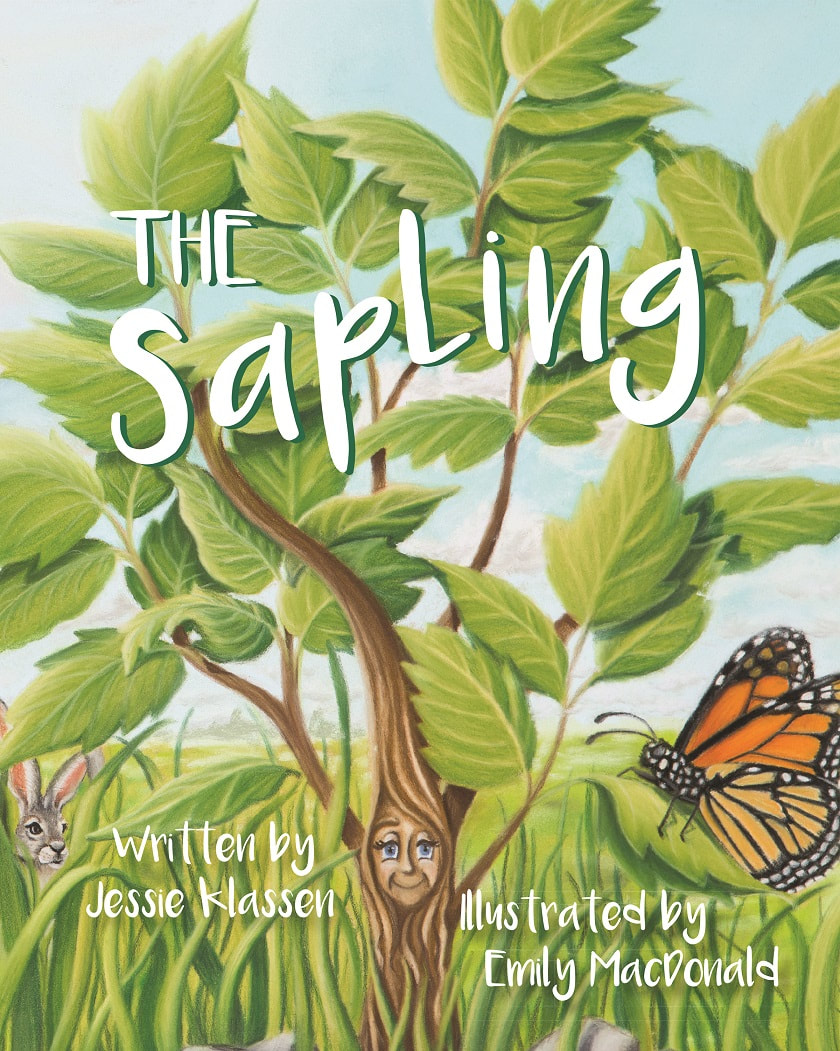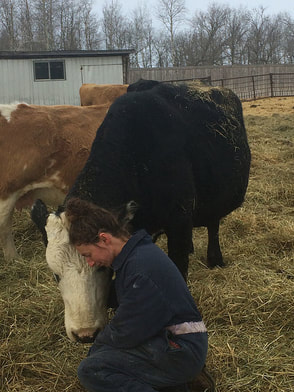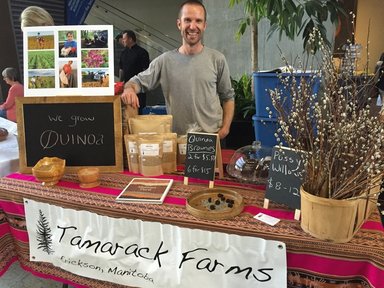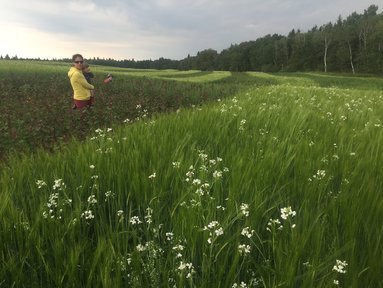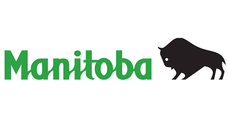featured farmers
Lynn Wetherill - Local Grower, Kelwood, Mb
Meet Lynn Wetherill!
Lynn is an organic veggie grower who makes her home in the hills south west of Kelwood. She is a busy Mom of 4 who is also active in the building and ongoing support of our beautiful natural playground, working with the local agricultural fair, as well as running her own business!
Lynn has a diploma in Greenspace Management from Red River college, and has also taken a organic vegetables seed production course.
'I have always loved gardening and as I learned about the environment through my course at college, it inspired the idea of starting my own organic veggie company, which led me to start the process of market gardening. I wanted to do something that would enable me to stay at home with my kids, and I thought this would be a good mix'
Lynn is heading into her second year running her beautiful garden. She sells every Saturday at the Onanole Farmers Market and will be providing fresh potatoes, peas, corn, mixed greens, spinach, celery, peppers, onions, leeks, carrots, radish, beets, beans, tomatoes, cucumbers, watermelons, pumpkin, zucchini, cantaloupe and butternut squash. She will also be trying the organic growing technique of mesh netting over broccoli & cauliflower.
In addition to selling at the market, you can also reach Lynn via e-mail at [email protected] to reserve a basket of veggies for pickup.
We also encourage you to give her a friendly follow at WETHERILLS FRESH FOOD on Facebook, or HERE on Instagram!
The Harvest Sun proudly partners with Lynn, she is one of our local veggie providers for the backstage meals all wkd during the fest! Delicious!
Lynn is an organic veggie grower who makes her home in the hills south west of Kelwood. She is a busy Mom of 4 who is also active in the building and ongoing support of our beautiful natural playground, working with the local agricultural fair, as well as running her own business!
Lynn has a diploma in Greenspace Management from Red River college, and has also taken a organic vegetables seed production course.
'I have always loved gardening and as I learned about the environment through my course at college, it inspired the idea of starting my own organic veggie company, which led me to start the process of market gardening. I wanted to do something that would enable me to stay at home with my kids, and I thought this would be a good mix'
Lynn is heading into her second year running her beautiful garden. She sells every Saturday at the Onanole Farmers Market and will be providing fresh potatoes, peas, corn, mixed greens, spinach, celery, peppers, onions, leeks, carrots, radish, beets, beans, tomatoes, cucumbers, watermelons, pumpkin, zucchini, cantaloupe and butternut squash. She will also be trying the organic growing technique of mesh netting over broccoli & cauliflower.
In addition to selling at the market, you can also reach Lynn via e-mail at [email protected] to reserve a basket of veggies for pickup.
We also encourage you to give her a friendly follow at WETHERILLS FRESH FOOD on Facebook, or HERE on Instagram!
The Harvest Sun proudly partners with Lynn, she is one of our local veggie providers for the backstage meals all wkd during the fest! Delicious!
~2018 featured farmer~
Meet Jessie! She lives and farms with her husband Mike, & kids Summer, Shep and Huckleberry on
Spirit Wind Farm near Glenella, Mb. Not only is she rocking the farming life, but she is also a published author!
Check out her book here! -> The Sapling
We will be heading out to visit and adventure with her on her farm soon!
But until then pop over to her amazing blog here -> https://www.jessieklassen.com
And give her a friendly follow on Instagram here -> www.instagram.com/jessienatureschild
2017 Featured Farmers
RYAN, ALE, TIAGO & ANALUCIA from TAMARACK FARMS in Erickson, Mb!
RYAN, ALE, TIAGO & ANALUCIA from TAMARACK FARMS in Erickson, Mb!

We loved working with Ryan Pengelly & Alexandra Lozada from Tamarack Farms based near Erickson, MB - here is a little interview we did with them about their life & farm.
You can find Tamarack Farms online at
www.tamarackfarms.ca
ON Facebook: www.facebook.com/tamarackfarms
and Instagram: @tamarackfarms
You will also find Ryan & Ale onsite this year, at the Harvest Sun, in our Makers & Growers market! So plan to make a trip over to talk with them, grab some delicious locally grown quinoa and order yourself
some pastured pork or chickens!!
Can you give us a little bit of back story? How did you meet and then choose to farm in Manitoba?
We are Ryan Pengelly, Alexandra Lozada, Tiago Pengelly-Lozada (6 years old in January), Analucia Pengelly-Lozada (3 years old in May)
I (Ryan) have always been drawn to farming. I remember riding the combine from an early age with my father. I recall growing a small plot of maximillian sunflower when I was 12 years old with my father’s help. I raised and sold chickens throughout my teenage years. Cutting, baling and selling hay put me through university. But also during that time, I became addicted to travel and cross-cultural experiences which made me gravitate to study psychology and anthropology. It was during my university years in 2004 that I studied abroad in Lima, Peru, and guess what…I met a young, city woman named Alexandra Lozada.
Alexandra was born and raised in Lima, Peru, a large metropolis of about 9 million people. She grew up with a love for food and cooking, especially Peruvian cuisine: ceviches, lomo saltados, pollo con arroz. Quinoa, however, had become a less desirable staple in an increasingly modern and urban Peruvian society. Since the 1950s, Peru followed the same global trend (and Canadian trend) of an increasing urban population and stigmatization of rural, agriculture lifestyle and racism towards indigenous people and their traditions, such as quinoa.
After meeting in 2004, it took over 10 years for Ryan and Alexandra to move to Erickson and a rural, agricultural lifestyle. Returning was a decision strongly motivated by Ryan’s desire to return to the family farm, to be part of the place called home, and raise our family on the farm and in a rural community. On the other hand, the growth in the local food sector has offered new opportunities to smaller, direct marketing farms that – despite its challenges – has provided the first real incentive for some farmers to adapt the old idea of smaller-scale mixed farming that has been the norm in the long history of agriculture worldwide. It have been relatively recent that the rural landscape has been emptied of families and communities, driven by modern agriculture’s innovations - based on pesticides and synthetic fertilizers – shrinking profit margins for farmers and ballooning average farm sizes in order to remain financially viable.
We first tried growing quinoa in 2009 because of our strong interest in local food and our connection to Peru, but only harvested our first crop – a 1 acre field – in 2014. For the last two summers, we have grown 20 acres of a “nutty brown” variety of quinoa and we have experimented with 14 different varieties of quinoa – white, red, and black varieties. So far, we have only successfully grown our ‘nutty brown’ variety which has grown well in our cooler, ‘mountain’ climate. When cooked, our quinoa has a distinct nutty flavour, chewy texture and darker colour compared with white quinoa.
Can you outline some of the challenges or triumphs of farming/growing Quinoa in Manitoba?
Growing quinoa is risky. Few farmers will want to leave the money-makers of soy, wheat and canola. There is no agronomic recipe for growing quinoa like other well-known grains and it has meant experimenting with different varieties. Some years our yields have been very low and inadequate to support a farm business, but other years our yield has been very promising.
Cleaning quinoa is unknown to seed cleaners in Manitoba because most varieties have a bitter saponin coating that must be removed via washing. There are a few saponin-free varieties, but they are either “owned” by other companies or the variety hasn’t grown well for us, such as red quinoa. This has meant that we have been required to experiment on farm with our own dry and wet cleaning of the quinoa seed. We have really enjoyed the trial-and-error process, but it also meant that without a provincially inspected facility, we have been limited to selling our quinoa in very small quantities through farmer’s markets and farm gate. Restaurants, retail and other processors have been off limits to our marketing aspirations, which has meant lower volume sales that have not financially supported a viable farm business. Over the last 6 months, we have turned this regulatory barrier into a challenge. We renovated an existing building on our farm and recently obtained a permit from Manitoba Agriculture to operate our cleaning facility as a commercial, food grade facility.
Direct marketing to consumers, chefs, and small independent retail outlets has been extremely rewarding. Engaging with individuals and families at farmer’s markets or at our farm brings us a great sense of satisfaction. We love showing up at a restaurant and chatting with a chef and seeing how our quinoa will be transformed that day. We love sharing stories through social media and showcasing our lifestyle and the complexities, risks, and rewards of farming: a bumper crop, the loss of a sow that was like a sister, how we manage soil health, or the result of a devastating frost. We are no longer anonymous producers of a commodity that could be shipped anywhere in the world. We are creative farmers with a real livelihood on the line. We grow real, whole, nutritious food for people we get to meet and form a relationship with. We are the entire value chain, which means a fair price to our family farm. It means that by supporting farms like ourselves, our customers have become part of the solution to our emptying rural landscape, the disappearance of family farms, and the loss of agro-ecological farming practices. Consumer purchasing power works.
Why do you feel that raising your family on a farm, growing & buying local/organic is important?
We love producing local food for our family and the broader community of Manitoba. Farming for us started as a means of producing our own food, but has also served as a way for us to return to Ryan’s family farm. Farming has been a challenging business, but roots us in the land and connects us with the forests and fields, plants, animals, fungi, and bacteria. For Ryan, farming is a way of being part of the landscape.
Transitioning to organic agriculture has been a challenge because it has meant establishing new networks with other organic farmers and developing an entirely new system of knowledge and production. Growing quinoa has been particularly challenging to grow organically because it is not a very competitive plant. But we have found a few techniques that have worked quite well – good crop rotation and field preparation, green manures, and interrow cultivation. In fact, turning to organic farming will be a lifetime endeavour. Local and organic – especially #knowyourfarmer - is important because it represents an independent (of corporate agriculture) form of agriculture, more biodiverse farms, and ecologically-minded farming. Organic isn’t just about removing pesticides and synthetic fertilizers. It is about completely changing a farm/farmer’s production and knowledge system to an agro-ecological system.
Farming is much a part of how we raise our children, from the small romantic moments (like Tiago taking care of the pigs) to the frustratingly mundane experiences (like trying to figure out how to feed the pigs when the kids are yelling that they hate farming). We decided to move back to the farm to give our children an upbringing similar to the upbringing Ryan had, with the good and the bad, with the rewards and the stress. We feel farming is a wonderful lifestyle and skill to pass on to our children in our changing world. We believe that a more diversified and local agriculture system – urban and rural – will make our society more resilient and adaptable as we face new environmental challenges over the next 100 years.
Find out more about what Ryan & Ale are up to on their website, Facebook page and follow them on Instagram! Show your support and don't forget to #thankafarmer
You can find Tamarack Farms online at
www.tamarackfarms.ca
ON Facebook: www.facebook.com/tamarackfarms
and Instagram: @tamarackfarms
You will also find Ryan & Ale onsite this year, at the Harvest Sun, in our Makers & Growers market! So plan to make a trip over to talk with them, grab some delicious locally grown quinoa and order yourself
some pastured pork or chickens!!
Can you give us a little bit of back story? How did you meet and then choose to farm in Manitoba?
We are Ryan Pengelly, Alexandra Lozada, Tiago Pengelly-Lozada (6 years old in January), Analucia Pengelly-Lozada (3 years old in May)
I (Ryan) have always been drawn to farming. I remember riding the combine from an early age with my father. I recall growing a small plot of maximillian sunflower when I was 12 years old with my father’s help. I raised and sold chickens throughout my teenage years. Cutting, baling and selling hay put me through university. But also during that time, I became addicted to travel and cross-cultural experiences which made me gravitate to study psychology and anthropology. It was during my university years in 2004 that I studied abroad in Lima, Peru, and guess what…I met a young, city woman named Alexandra Lozada.
Alexandra was born and raised in Lima, Peru, a large metropolis of about 9 million people. She grew up with a love for food and cooking, especially Peruvian cuisine: ceviches, lomo saltados, pollo con arroz. Quinoa, however, had become a less desirable staple in an increasingly modern and urban Peruvian society. Since the 1950s, Peru followed the same global trend (and Canadian trend) of an increasing urban population and stigmatization of rural, agriculture lifestyle and racism towards indigenous people and their traditions, such as quinoa.
After meeting in 2004, it took over 10 years for Ryan and Alexandra to move to Erickson and a rural, agricultural lifestyle. Returning was a decision strongly motivated by Ryan’s desire to return to the family farm, to be part of the place called home, and raise our family on the farm and in a rural community. On the other hand, the growth in the local food sector has offered new opportunities to smaller, direct marketing farms that – despite its challenges – has provided the first real incentive for some farmers to adapt the old idea of smaller-scale mixed farming that has been the norm in the long history of agriculture worldwide. It have been relatively recent that the rural landscape has been emptied of families and communities, driven by modern agriculture’s innovations - based on pesticides and synthetic fertilizers – shrinking profit margins for farmers and ballooning average farm sizes in order to remain financially viable.
We first tried growing quinoa in 2009 because of our strong interest in local food and our connection to Peru, but only harvested our first crop – a 1 acre field – in 2014. For the last two summers, we have grown 20 acres of a “nutty brown” variety of quinoa and we have experimented with 14 different varieties of quinoa – white, red, and black varieties. So far, we have only successfully grown our ‘nutty brown’ variety which has grown well in our cooler, ‘mountain’ climate. When cooked, our quinoa has a distinct nutty flavour, chewy texture and darker colour compared with white quinoa.
Can you outline some of the challenges or triumphs of farming/growing Quinoa in Manitoba?
Growing quinoa is risky. Few farmers will want to leave the money-makers of soy, wheat and canola. There is no agronomic recipe for growing quinoa like other well-known grains and it has meant experimenting with different varieties. Some years our yields have been very low and inadequate to support a farm business, but other years our yield has been very promising.
Cleaning quinoa is unknown to seed cleaners in Manitoba because most varieties have a bitter saponin coating that must be removed via washing. There are a few saponin-free varieties, but they are either “owned” by other companies or the variety hasn’t grown well for us, such as red quinoa. This has meant that we have been required to experiment on farm with our own dry and wet cleaning of the quinoa seed. We have really enjoyed the trial-and-error process, but it also meant that without a provincially inspected facility, we have been limited to selling our quinoa in very small quantities through farmer’s markets and farm gate. Restaurants, retail and other processors have been off limits to our marketing aspirations, which has meant lower volume sales that have not financially supported a viable farm business. Over the last 6 months, we have turned this regulatory barrier into a challenge. We renovated an existing building on our farm and recently obtained a permit from Manitoba Agriculture to operate our cleaning facility as a commercial, food grade facility.
Direct marketing to consumers, chefs, and small independent retail outlets has been extremely rewarding. Engaging with individuals and families at farmer’s markets or at our farm brings us a great sense of satisfaction. We love showing up at a restaurant and chatting with a chef and seeing how our quinoa will be transformed that day. We love sharing stories through social media and showcasing our lifestyle and the complexities, risks, and rewards of farming: a bumper crop, the loss of a sow that was like a sister, how we manage soil health, or the result of a devastating frost. We are no longer anonymous producers of a commodity that could be shipped anywhere in the world. We are creative farmers with a real livelihood on the line. We grow real, whole, nutritious food for people we get to meet and form a relationship with. We are the entire value chain, which means a fair price to our family farm. It means that by supporting farms like ourselves, our customers have become part of the solution to our emptying rural landscape, the disappearance of family farms, and the loss of agro-ecological farming practices. Consumer purchasing power works.
Why do you feel that raising your family on a farm, growing & buying local/organic is important?
We love producing local food for our family and the broader community of Manitoba. Farming for us started as a means of producing our own food, but has also served as a way for us to return to Ryan’s family farm. Farming has been a challenging business, but roots us in the land and connects us with the forests and fields, plants, animals, fungi, and bacteria. For Ryan, farming is a way of being part of the landscape.
Transitioning to organic agriculture has been a challenge because it has meant establishing new networks with other organic farmers and developing an entirely new system of knowledge and production. Growing quinoa has been particularly challenging to grow organically because it is not a very competitive plant. But we have found a few techniques that have worked quite well – good crop rotation and field preparation, green manures, and interrow cultivation. In fact, turning to organic farming will be a lifetime endeavour. Local and organic – especially #knowyourfarmer - is important because it represents an independent (of corporate agriculture) form of agriculture, more biodiverse farms, and ecologically-minded farming. Organic isn’t just about removing pesticides and synthetic fertilizers. It is about completely changing a farm/farmer’s production and knowledge system to an agro-ecological system.
Farming is much a part of how we raise our children, from the small romantic moments (like Tiago taking care of the pigs) to the frustratingly mundane experiences (like trying to figure out how to feed the pigs when the kids are yelling that they hate farming). We decided to move back to the farm to give our children an upbringing similar to the upbringing Ryan had, with the good and the bad, with the rewards and the stress. We feel farming is a wonderful lifestyle and skill to pass on to our children in our changing world. We believe that a more diversified and local agriculture system – urban and rural – will make our society more resilient and adaptable as we face new environmental challenges over the next 100 years.
Find out more about what Ryan & Ale are up to on their website, Facebook page and follow them on Instagram! Show your support and don't forget to #thankafarmer






